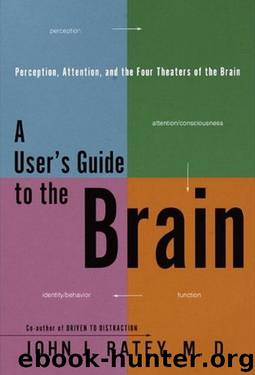A User's Guide to the Brain: Perception, Attention, and the Four Theaters of the Brain by John Ratey

Author:John Ratey [Ratey, John]
Language: eng
Format: epub
Tags: Alfred A. Knopf
Published: 2011-09-05T06:58:00+00:00
EXPLICIT VERSUS IMPLICIT MEMORY
AS SCHACTER’S WORD experiments show, human memory is distributed throughout the brain, yet certain memory functions are still dependent on certain areas. The brain’s development encourages this. Procedural memory or skill learning is the first memory function to develop in the brain’s early stages of growth; a baby learns how to extend its arm. Then, its perceptual representational system solidifies, and the baby recognizes objects. Next it acquires semantic or “factual” memory, and the baby calls the round object “ball.” Lastly, it develops the capacity for episodic memory, which allows it to consciously recall past experiences, and the baby remembers the last time it threw the ball and the dog chased it, and throws it again because watching the pup pounce is just so much fun. This hierarchy and layering of memory systems allows for many complex memory functions.
The last stage of the brain’s development creates the specialization of the hemispheres. This is when certain memory functions get localized, though most still have some basis in different regions, and is what makes explicit and implicit memory possible.
Explicit memory encodes factual knowledge—names, faces, events, things. It depends on an initial dialogue between the hippocampus and the temporal lobe. Explicit memories are directly accessible to our conscious awareness. They are flexible, rapidly retrieved, and occasionally unreliable. Implicit memory is responsible for the laying down of skills and habits that, once learned, do not have to be consciously thought about, such as eating, talking, walking, riding a bike, and the way to go about making friends. They are inflexible, slow, but extremely reliable, and involve the basal ganglia and cerebellum.
Research is helping to delineate further which regions of the brain are involved in explicit and implicit memories. For example, patients suffering from disorders of the basal ganglia, such as Parkinson’s disease and Huntington’s disease, seem to have no problem remembering facts and events. However, they are no longer able to properly perform an appropriate sequence of habituated movement, such as walking. They also cannot recognize the next item in a mental sequence that has been explained to them over and over again; they can retrieve memories that are stored, but can’t store new ones.
A great deal of our everyday functioning and learning is the result of turning explicit memories into implicit ones. For example, explicit procedural memories can become implicit when we are able to complete a task without referring to how we have done it in the past. When we are learning how to ride a bike, each time we get on that seat we have to remember what we did right and wrong the time before. But as we master the task, we no longer have to actively remember what to do. We just do it. The procedural memory, at first explicit, has become implicit. Larry Squire at the University of California at San Diego has used EEG and PET scans to show that the location of the memory in the brain changes as it becomes implicit.
One important
Download
This site does not store any files on its server. We only index and link to content provided by other sites. Please contact the content providers to delete copyright contents if any and email us, we'll remove relevant links or contents immediately.
The Art of Thinking Clearly by Rolf Dobelli(10454)
Mindhunter: Inside the FBI's Elite Serial Crime Unit by John E. Douglas & Mark Olshaker(9320)
Change Your Questions, Change Your Life by Marilee Adams(7759)
Nudge - Improving Decisions about Health, Wealth, and Happiness by Thaler Sunstein(7692)
Mastermind: How to Think Like Sherlock Holmes by Maria Konnikova(7323)
The Power of Now: A Guide to Spiritual Enlightenment by Eckhart Tolle(5752)
Men In Love by Nancy Friday(5234)
Altered Sensations by David Pantalony(5093)
Factfulness: Ten Reasons We're Wrong About the World – and Why Things Are Better Than You Think by Hans Rosling(4733)
The Confidence Code by Katty Kay(4251)
Thinking in Bets by Annie Duke(4218)
Man and His Symbols by Carl Gustav Jung(4130)
The Worm at the Core by Sheldon Solomon(3486)
Why Buddhism is True by Robert Wright(3446)
Liar's Poker by Michael Lewis(3441)
Three Women by Lisa Taddeo(3422)
The Inner Life of Animals by Peter Wohlleben(3310)
Descartes' Error by Antonio Damasio(3270)
How Music Works by David Byrne(3259)
